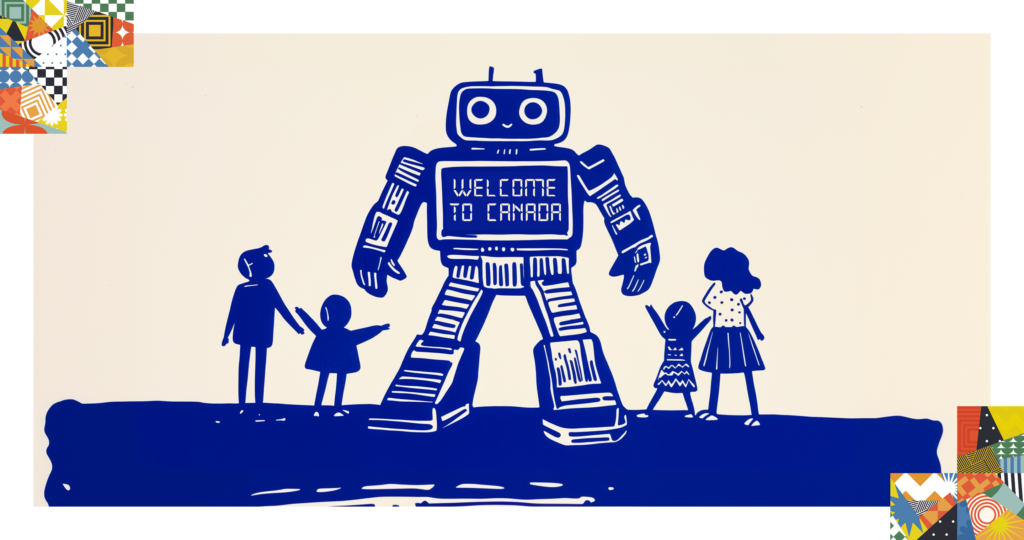FA.I.R FOR ALL: AI’s impact on settlement & language learning
August 26, 2024

This innovative webinar series by ARAISA & ISANS is dedicated to guiding and demonstrating the potential of generative AI technology in the settlement and integration sector. You will find out AI can significantly enhance the settlement and integration experience for our clients and colleagues, helping to reduce client waitlists, shorten wait times, and lighten workloads—a win-win for everyone!
From September 2024 to March 2025, join us for the whole series or for a few webinars! You’ll gain practical insights and guidance and explore the latest AI technologies and processes currently employed in the settlement and integration sector. The series covers a variety of topics, including appropriate client use, new tools for language instructors, and ethical guidelines such as Digital Citizenship and technology standards.
This webinar series aims to serve as a platform for regional knowledge exchange, collaboration, and innovation by bringing together local experts, practitioners, and stakeholders from across the country to address the dynamic and evolving subject of integrating AI in our sector.
Please note that registration is required for each session.
If you have any questions, please contact David Neilsen, Supervisor, Language Services, at dneilsen@isans.ca
To watch or re-watch the previous sessions, click here!
Upcoming Webinars
Wednesday, February 19, 2025
Addressing AI Use in Asynchronous Writing Tasks: Instructor Strategies & Program Adaptations
3 p.m. to 4:30 p.m. AT
For online and blended teachers and administrators
In English, automatic close captions in French available
In today’s digital landscape, AI tools have become increasingly prevalent in asynchronous writing tasks, posing unique challenges and opportunities for instructors of newcomer adult clients. This webinar explores how these tools impact traditional learning environments, addressing the problem of balancing technology use with effective language acquisition. We will discuss instructor strategies for integrating AI while maintaining pedagogical integrity and program adaptations that support learners’ unique needs, ensuring equitable access and enhancing learning outcomes.
Speakers
Daniela Jost Guimaraes is an English teacher with over two decades years of experience in EAL. With a Master’s degree in IMTE from Saint Mary’s University and the Cambridge CELTA, she is now in the process of completing her DELTA. At ISANS, Daniela is facilitating the Internationally Educated Accountants (IEA) course. She is passionate about working in an intercultural setting, where she helps her students enhance their English proficiency and develop the intercultural awareness essential for success in Canada. Recently, she has begun integrating AI tools into her classes to boost her clients’ writing skills. Outside of work, Daniela enjoys spending time with her family, reading, crafting, hiking, and exploring the beautiful landscapes of Nova Scotia.
Denise Callahan is an English as an Additional Language (EAL) Instructor at the Immigrant Services Association of Nova Scotia (ISANS), where she has been teaching since 2017. With a Bachelor of Commerce and a Master’s degree in Applied Linguistics, Denise combines a strong academic background with practical experience in EAL and EAP (English for Academic Purposes) instruction. Passionate about leveraging her expertise to support newcomers to Canada, she focuses on integrating language learning with practical, real-world applications. She has been exploring AI with her learners. Outside of work, Denise enjoys discovering new places with her puppy and creating art through rug hooking.
Wednesday, March 19, 2025
Future Trends: AI in Education: Predict How AI Will Shape Language Learning, Classroom Dynamics, and Teacher Roles
3 p.m. to 4:30 p.m. AT
For online and blended teachers and administrators
In English, automatic close captions in French available
Generative Artificial Intelligence (GenAI) is transforming the educational landscape, reshaping how languages are learned, taught, and experienced. This presentation explores GenAI’s potential impacts on language learning, examining how innovative tools can personalize education, facilitate dynamic classroom interactions, and redefine the teacher’s role as a guide and facilitator. Join us as we explore future trends, challenges, and opportunities, and discuss how GenAI can support learners’ language learning, empower educators, and strengthen outcomes in diverse settlement-focused programs.
Speakers
Julian L’Enfant is an Educational Developer at Saint Mary’s University with over 27 years of experience in educational management, teacher education, and training. Currently pursuing a PhD in E-Research and Technology-Enhanced Learning at Lancaster University, Julian focuses on the role of GAI, emerging technologies, and inclusive education in higher education. His forthcoming paper, “AI as a Reflective Coach in Graduate ESL Practicum,” explores innovative applications of AI in teacher development. Julian is committed to advancing the integration of AI into teaching and learning practices to create more inclusive and effective educational environments.
Sandra Borges has 20 years of experience as an English Language Teacher. She holds a master’s degree in Teaching English as an International Language from Saint Mary’s University, postgraduate degrees in Bilingual Education and English Language Teaching, and a BA in Languages. She has also earned DELTA (M2), CELTA, ICELT, and TKT certifications. Sandra is a Team Lead and EAL Instructor at ISANS, teaches in Dalhousie University’s English in Canada Program, and tutors online for the Oxford Teacher Academy offered by Oxford University Press UK.
